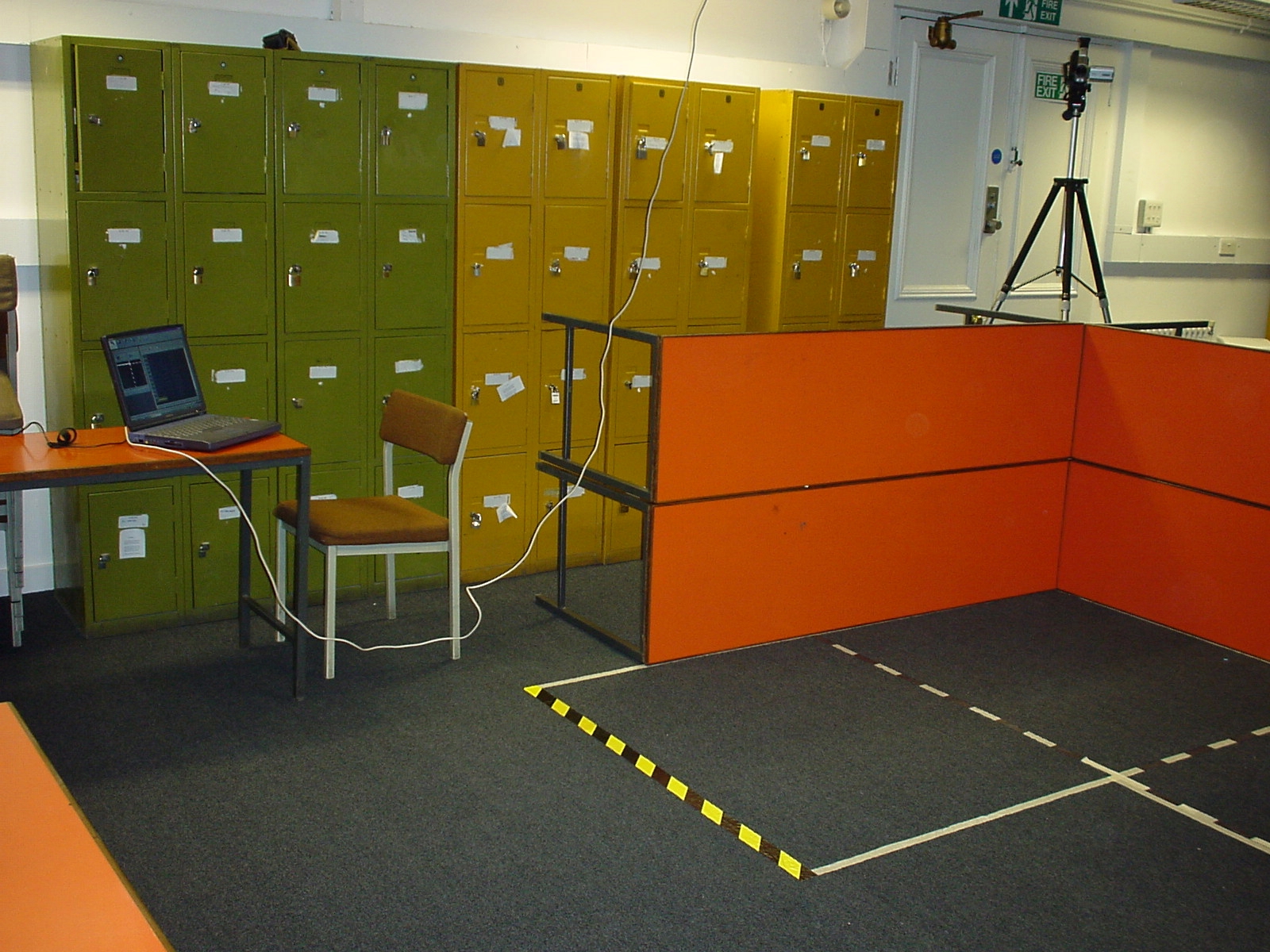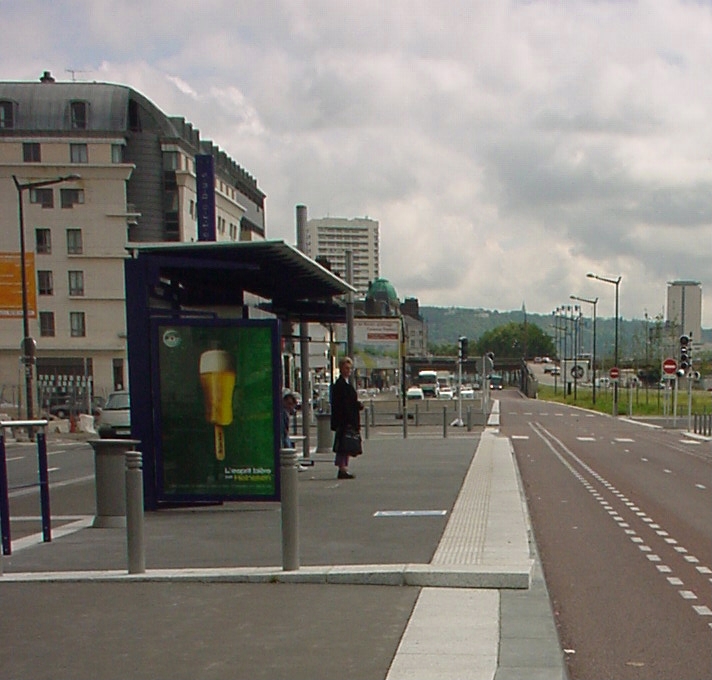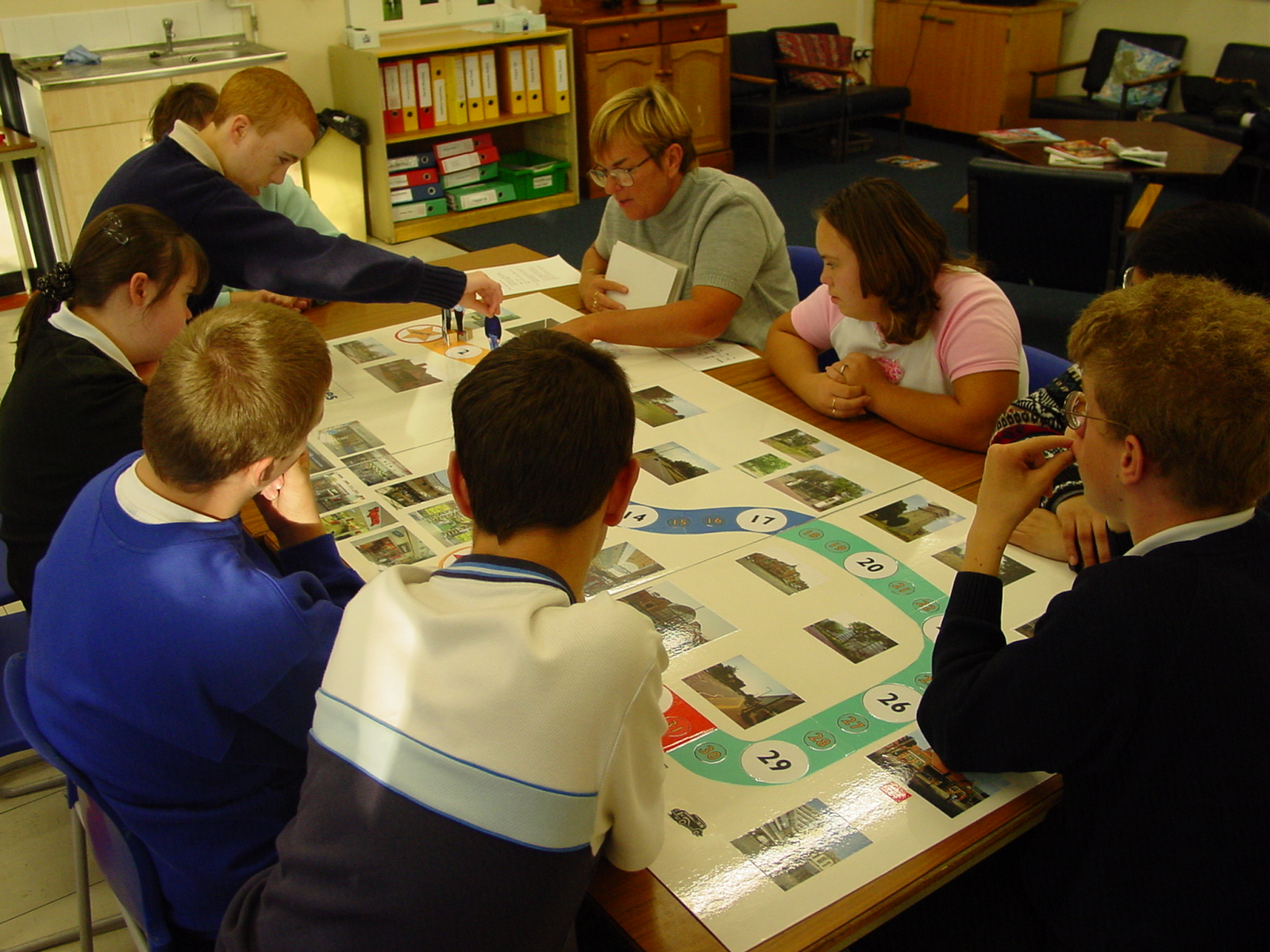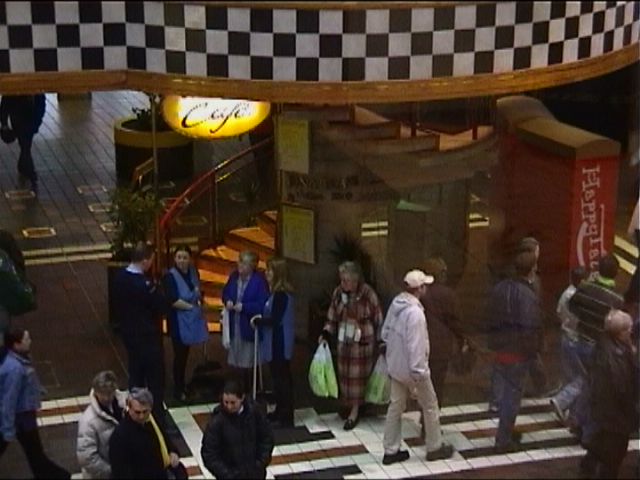

Accessibility Research Group
| Objectives | Approach
|
| research team | current
projects | list of publications |
Latest News! | PhD Research |
!!!New
book!!!
The Accessibility Research Group is based in the Centre for Transport
Studies at University College London. It has a wide-ranging brief to understand
what accessibility is, why it is important, what barriers to access exist,
how these could be eliminated or reduced and who these barriers affect.
Our research tries to understand how people are disabled by poor design
of the transport system so that we can learn how to provide accessible
systems that enable people to achieve their potential. You can see
details of the members of the group, examples of our current and recent
research, a list of publications and latest developments in the group by
clicking on the relevant links above.
Objectives
-
To carry out basic and applied research into all aspects of accessibility
to transport systems.
-
To work towards the elimination of barriers to access for all people especially
people who experience physical, sensory or cognitive barriers to their
involvement in society.
-
To base our research on user-centred approach, working with people to understand
their difficulties and to investigate solutions they find appropriate.
-
To disseminate results and work in progress to as wide an audience as possible.
Approach
Our definition of accessibility is "the ease with which a person can reach
and take part in, or use, an activity" and we are concerned to make
sure that the design of the transport system does not disable people from
reaching the activity. Activities designed to be accessible to private
cars are likely to be inaccessible to people who have no access to a car
and so we work with public transport. Therefore a lot of our research concerns
accessibility and public transport. Older people and people with physical,
sensory or cognitive problems often have difficulties
using public transport which mean that they either have to purchase and
run a car or they do not go out. Many other people face the same dilemma
- carrying heavy shopping or supervising small children are just two examples.
If they happen to live in a rural area the lack of public transport can
be a major cause of unwanted isolation. This is because there is a gap
in the understanding between the accessibility offered by the transport
system- especially public transport - and the needs of the people. The
Accessibility Research Group is working on several projects to tackle these
problems from a number of different perspectives.
We believe that the world should be designed to be accessible. This
includes buildings and infrastructure, vehicles, planning and operating
systems, network design, information and training. Our approach is to try
to understand accessibility, to find ways of eliminating or reducing barriers
and to test these, both in controlled laboratory settings and in the real
world. We work closely with people who are subjected to barriers so that
we can understand the problems better and ensure that any solutions are
appropriate. We are known for a radical approach to the research area,
attempting to answer challenging questions about the topics and the methodology
by which they can be investigated.
Our research interests include issues such as infrastructure design,
specification and design of accessible vehicles, rural public transport,
urban public transport micronetworks, community development, information
systems for people with learning difficulties, transport problems for people
with mental health problems, co-ordination of transport resources,
manoeuvrability of wheelchairs in restricted spaces, development of video
mapping devices, social inclusion and access to justice in planning processes.
top of page
Accessibility Research Group Latest News
July 2002
Our book has now been published. It is an account of the thinking behind
our research projects and some of the outcomes, both in terms of theory
and practice. The book is called "Accessibility and
the bus system: from concepts to practice" and is available from good
bookshops and the publishers (Thomas
Telford). The book is intended to encourage thinking about the calls
that society makes on transport systems and how they can respond in an
equitable and fair way. We discuss examples of practical applications of
our research on bus stop design and bus system operation to provide a thorough
and practical approach to the design of accessible bus systems.
We have just started working on a feasibility project called "Evaluating
Measures to Enhance the Mobility of Older and Disabled People". The project
is funded by the Department for Transport and involves, in addition to
the Accessibility Research Group, the University of Westminster and the
London School of Hygiene and Tropical Medicine. Dr Elvezia Cepolina has
joined the Group to work on this project.
Nick Tyler visited the Pontificia Universidad Católica del Perú
and gave a presentation called "Sociedad con Equidad: el papel del transporte",
which discussed the importance of accessible design in transport systems
to achieving an inclusive society, to a Seminar organised by the Consejo
Nacional de Integración de la persona con Discapacidad in Ayacucho.
June 2002
Ricardo Marar successfully defended his thesis
"Assessing the implementation of supranational regulatory
activity in the road freight sector" and has been awarded a PhD degree.
May 2002
Nick Tyler attended the Third Workshop on Trans-Alpine Networks in Stresa,
Italy, which was organised by the Interdisciplinary Centre for Co-operative
Research in the Social Sciences. He presented a paper on public participation,
which highlighted the need for governments and local people to work together
on the planning and design of transport projects and how this might be
achieved. He then visited Genoa, where he gave a short lecture on accessibility
and transport research at the University of Genoa.
Nick Tyler has been appointed Professor of Communities and Transport
at UCL. The promotion will take effect from October 2002.
March/April 2002
We have now been awarded a three-year grant for a project called TOCCATA
(Training Opportunities for Community-Centred Accessible Transport Applications).
This will involve working with the University of Brasilia to raise sensitivity
to disability issues in local schools with children of all ages to develop
courses to help improve the long term understanding of social inclusion
in Brasilia. The project is funded by the British Council. This project
coincides well with the accessibility awareness project being carried out
jointly by the Accessibility Research Group and the Pontificia Universidad
Catolica in Lima, Peru.
January/February 2002
The University of Genoa has conferred a doctorate on Elvezia Cepolina for
her research into the microscopic simulation of pedestrians, for which
the empirical work was carried out in the Accessibility Research Group.
We are hoping to find ways of continuing this work with Elvezia in the
future.
The game produced as part of the TRUMPET project will be made available
via the web. Please look at the TRUMPET web
page and if you are interested in obtaining a copy, plese contact Chris
Cook.
December 2001
Elvezia Cepolina presented a paper to the Annual Convention "Metodi e Tecnologie
dell'Ingegnaria dei Trasporti", held at Reggio Calabria (Italy), on the
microscopic simulation of pedestrian behaviour carried out while she was
studying at UCL.
top of page
PhD Study with the Accessibility Research Group
top of page
Accessibility is a subject area which is ripe for doctoral research.
Current
doctoral projects include the study of
bus stop
design and operation,
accessibility
issues for micronetworks and feeder services and implementation of
supranational regulation. Other areas of interest include cognitive analysis
of information needs, work with people with learning difficulties, pedestrian
activities, infrastructure design and community-centred governance. Here
are some examples of topic areas which could arise from our current and
previous research. Feel free to discuss these and other ideas with Nick
Tyler.
 A laboratory set up to study details of the manoeuvrability of wheelchairs.
User-centred wheelchair design is a potential PhD topic. We have also been
examining the implications for wheelchair access to historic houses.
A laboratory set up to study details of the manoeuvrability of wheelchairs.
User-centred wheelchair design is a potential PhD topic. We have also been
examining the implications for wheelchair access to historic houses. |
 The buses that use this bus stop in Rouen (France) are guided optically.
How this - and other - technology could be used in other types of bus system
and the potential for the design of better local networks is another possible
PhD topic.
The buses that use this bus stop in Rouen (France) are guided optically.
How this - and other - technology could be used in other types of bus system
and the potential for the design of better local networks is another possible
PhD topic. |
 Young people testing a travel training game as part of the TRUMPET
project.
Developments of this work and other information-based research could yield
exciting topics for PhD research.
Young people testing a travel training game as part of the TRUMPET
project.
Developments of this work and other information-based research could yield
exciting topics for PhD research. |
 The study of pedestrian movement and people-centred infrastructure design
can generate a large number of potential PhD topics to help understand
how to make the pedestrian environment more socially inclusive.
The study of pedestrian movement and people-centred infrastructure design
can generate a large number of potential PhD topics to help understand
how to make the pedestrian environment more socially inclusive. |
Doctoral students have all the benefits of being members of the
UCL
Graduate School and of working within the
Centre for Transport Studies. Much of our research involves external
bodies such as Transport for London, local and central government and private
sector companies in the UK and overseas. In addition, those working within
the Accessibility Research Group can become involved in any of our research
projects - some of which can help to provide useful data sources, experimental
facilities, or interesting facets of problems which can be explored as
part of the doctoral research. This contact helps to keep the research
focused on real issues, while encouraging the more philosophical side of
PhD research to flourish. Doctoral students are encouraged to take part
in training courses organised by UCL or elsewhere as appropriate throughout
their period of study. If you are interested in doctoral study on any aspect
of accessibility, you should contact
Nick Tyler in the first instance to discuss the possibilities.
top of page
Current and Recent Projects
-
A specification for accessible bus stops has been developed designed, built
and tested in the EXCALIBUR
project.
-
ACCEPT
discussed a series of possibilities and implications of really accessible
public transport systems.
-
The PATH project developed
and implemented an accessible minibus miocronetwork in the London Borough
of Hackney.
-
The concepts and definitions behind the accessibility issue, including
the concepts underlying how to evaluate accessibility have been developed
in the APEX
project.
-
APTRA was designed to study the consequences of
high frequency public transport services in rural areas.
-
Brighton and Hove Council is being supplied
with specifications for accessible bus stops and footways for two bus routes.
-
A Transport Co-ordination Centre designed by UCL
is now in operation in a London Borough to provide the most appropriate
least cost transport solution at the time of need for social services users
and children with special education needs.
-
The provision of transport for community healthcare for mentally ill people
in rural Kent has
been reviewed and an approach to make travelling easier for this group
is being developed with the local health trust and local charities.
-
The detailed study of the interactions within bus
stops produced a simulation model useful to improve the design of such
facilities, with respect to bus operations and paying particular attention
to the ways in which passengers and buses interact at bus stops.
-
The modelling of interactions between buses and other
traffic is the subject of a project that will help the analysis of
mixed traffic networks and the design of bus services.
-
ELIXIR is the continuation of the APTRA
project. We are now examining how the successful accessible bus service
can be used to enhance the provision of health and social care in the area.
-
DIMPLE is developing a mapping device to help
people with learning difficulties navigate their way around so that they
can begin to use public transport to help them increase their independence
and quality of life.
-
We are working with schools in Southend in a project called TRUMPET
which is helping to develop ways of communicating the benefits of our research
to children with learning difficulties.
-
We are working with the Pontificia Universidad Catolica del Peru on a
project to improve social inclusion, to introduce techniques to enhance
accessibility in Peru and to start a programme of disability awareness
training in schools.
-
Together with researchers from the Pontificia Universidad Catolica del
Peru, we are part of a team which carries out assessments
of transport projects in the imperial city of Cusco, Peru.
-
Training Opportunities for Community Centred Accessible Transport Applications
(TOCCATA) is working with the Universidade de Brasilia to develop better
training at university level and a disability and transport awareness programme
for schools.
-
PUPPIT is introducing a public participation
process into the programme of accessible bus stop construction in Brighton
and Hove.
-
We are conducting a feasibility study on the evaluation
of mobility and accessibility measures for older and disabled people
for the Department for Transport. In this project we are working with the
University of Westminster and the London School of Hygiene and Tropical
Medicine.
top of page
Research Team
top of this page
(Back
to the Research at the Centre for Transport Studies at UCL page)
Return
to the Centre for Transport Studies site or to UCL
home page.
Please note that any views expressed
here do not necessarily reflect UCL College policy. No claim is made, explicit
or implied, about the suitability of any data presented here for any purpose.
All rights are reserved by individual members of the Dept., the Dept. itself,
or UCL as appropriate, unless otherwise indicated. Any links to pages provided
by individuals in the department are done so on the understanding that
they agree to abide by the College and draft UCL Guidelines.
Last updated July 2002
Please send any comments or queries about this web site to
the webmaster



